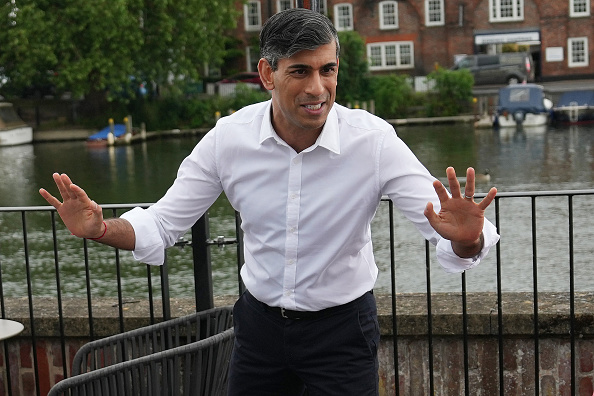British Prime Minister Rishi Sunak is promising to cut immigration levels if his Conservative Party wins next month’s election, making the issue one of the major battlegrounds of the upcoming vote.
Sunak hopes the issue will distinguish his party from the opposition Labour Party, which is currently ahead by more than 20 points in opinion polls.
THE IMMIGRATION ISSUE
Immigration has long been a major political question in Britain, with voters expressing concern that large influxes put excess pressure on housing, education and the state-run National Health Service, as well as damaging social cohesion.
In 2010, Conservative then-prime minister David Cameron pledged to bring net migration back to tens of thousands a year, a target he never came close to reaching.
Ending the free movement of people into Britain from other European countries was a major factor that led to the 2016 vote to leave the European Union, with those championing Brexit promising it would help bring back control of Britain’s borders.
However, net migration, which reached 329,000 in 2015, has continued to rise.
THE LATEST FIGURES
According to the most recent official figures in May, the provisional total for 2023 showed net immigration of 685,000, down from a record high of 764,000 in 2022. That drop was largely due to a fall in the numbers moving to the UK from Hong Kong and Ukraine under humanitarian visa programmes.
Indian nationals were by far the largest nationality coming to the UK last year, accounting for about a fifth of overall immigration, followed by Nigerian and Chinese citizens.
The government said the migration rises were partly the result of the arrival of more students and people working in the care sector along with their dependents.
In January, Sunak introduced new rules to slash the numbers coming in by 300,000 by stopping international students bringing in family members, increasing the salary threshold for skilled worker visas by 48% to 38,700 pounds ($49,000), and restricting care workers from bringing in dependents.
The government said last month this had led to 79% fewer student dependent applications in the first four months of 2024, 30,000 fewer student visa applications compared to the same period the year before, and a 58% fall in applications by dependents of people working in the health and care sector.
WHAT ARE BENEFITS AND COSTS OF IMMIGRATION?
Experts say it is difficult to assess the benefits and costs of immigration. While a rise in migration adds to the demand on public services, migrants will also pay taxes and provide other economic benefits.
Critics of high immigration say it depresses wages, while rapid demographic change impacts society and makes integration almost impossible. They point to a 2018 report that suggested the net cost of immigration was more than 4 billion pounds in the financial year 2016/17.
However, a 2022 report by the Migration Observatory at the University of Oxford said the fiscal impact of migration to the UK was small but dependent on the migrants’ circumstances.
Some studies have shown foreign workers had little or no impact on overall wage or employment levels, and Britain’s acute shortage of candidates to fill vacancies was a problem for many company bosses.
Rain Newton-Smith, head of the Confederation of British Industry, said on Tuesday the overall needs of the economy had to be considered, such as in relation to skills shortages, rather than a simple focus on net migration figures.
ELECTION PROMISES
Sunak says if he wins the election, he will cap work and family visas at a yearly level agreed by parliament.
Leading Brexit campaigner Nigel Farage, now leader of the right-wing Reform Party, which polls suggest is sucking votes away from Sunak’s Conservatives, says net migration should fall to zero.
The opposition Labour Party says it would also lower net migration by reducing reliance on overseas workers, addressing the shortage of home-grown skills, and tackling rogue employers.
SMALL BOATS ACROSS THE CHANNEL
The issue over legal migration is separate to the equally politically contentious issue of stopping asylum seekers arriving in Britain without permission across the Channel from Europe in small boats.
Sunak’s scheme to send those arriving this way to Rwanda has failed to get off the ground before the election while Labour says it will scrap the policy.
More than 29,000 people arrived on small boats last year, after a record 45,775 in 2022. This year, more than 10,000 people have already made the Channel crossing.
Britain is spending more than three billion pounds a year on processing asylum applications, with the cost of housing migrants awaiting a decision in hotels and other accommodation running at about eight million pounds a day.
(Reuters)














